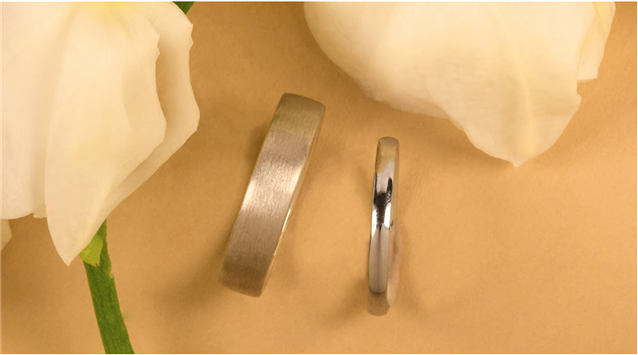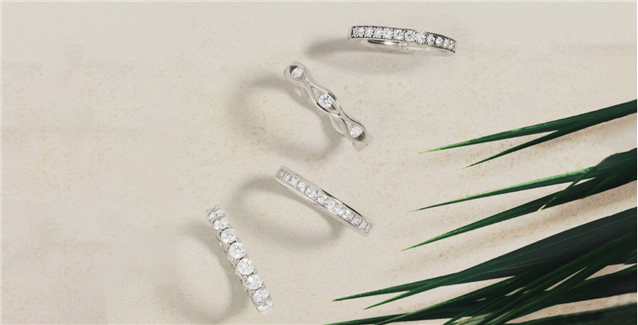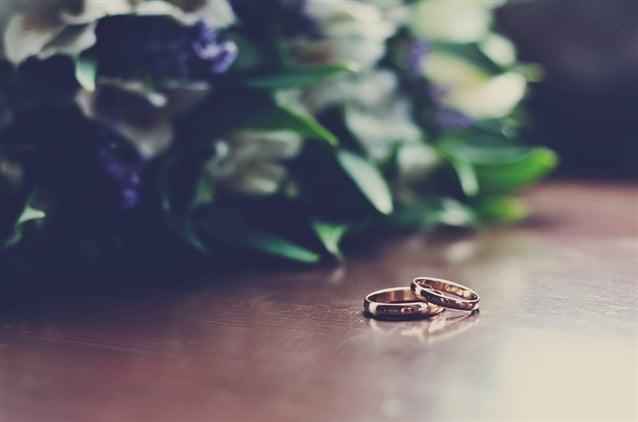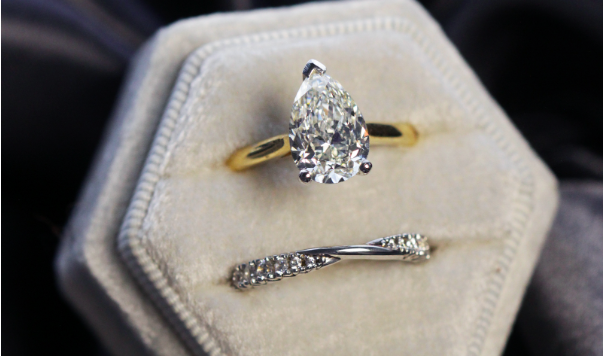How to choose the best metal for your Wedding Ring
When finding a wedding ring, some people will focus solely on the diamond they would like without realising the importance of choosing the right metal for their wedding ring. Popular metals used to make wedding rings include gold, platinum and palladium.
Each metal, even the alloys white gold and rose gold, will have their own unique properties used to determine how suitable a metal is for your wedding ring. When determining which metal is the best metal for men’s wedding bands and women’s wedding rings, the final decision is a personal one that will be somewhat influenced by individual preference in terms of each metal’s appearance. It is, however, necessary to also consider which metals will complement your lifestyle: especially as your wedding ring is one you’re likely to wear throughout most of the day, every day.
Palladium
A precious white metal, palladium is part of the platinum metal group. Palladium wedding rings have a natural white colour, which does not tarnish or require re-polishing. Considered to be a durable metal and usually possessing a 95% purity, as only 5% of it is typically formed of other metal alloys, it is a popular wedding ring metal choice.
It’s important to remember that the value of palladium tends to change more often than platinum. So, whether palladium or platinum is more expensive tends to depend on how the palladium market value is doing at any given time. As both metals tend to have very similar purity levels and are hypoallergenic, so everybody can wear them, palladium and platinum are both great metal choices for wedding rings.
Platinum
Due to possessing a hardness that enables it to be a very durable metal, and its natural white sheen, platinum wedding rings are a popular choice. Platinum’s natural whiteness means it complements most diamonds and gemstones, making the ring’s design and stone options available to the ring’s owner much more varied.
However, when comparing platinum and white gold jewellery, it’s worth bearing in mind that the increased durability of platinum also means it’s naturally heavier than white gold and other precious metals. So, when comparing platinum to other metals for your wedding ring, it’s advisable to consider whether having a lightweight ring is an important factor for you now, or is likely to be in the future. For sporty individuals, a platinum wedding ring is often a worthwhile investment, as it is less likely to get damaged and less susceptible to scratches when playing contact sports. If, however, you’re not particularly sporty and believe you would benefit from a less heavy wedding ring which still looks substantial, then white gold may be your best option.
Platinum is also less malleable than white gold, due to its greater density. This means it is more labour intensive and more costly for a jeweller to create an intricate design using platinum than it would be if they were to use white gold or another metal of lower density.
Gold
Considered to be a classic option, gold wedding rings have been popular for many generations. Pure gold, in its natural form, is too soft to create jewellery. Even if pure gold jewellery was somehow formed, it would be very easily scratched and misshapen. Gold is therefore mixed with different alloys, in order to produce the different types of gold, which are in fact colour variations of gold, with their own unique metal properties.
Karat is used to measure gold’s purity, and different levels of purity apply to each colour of gold, as the karat is determined by the percentage of alloys mixed with gold. The higher the Karat, the higher the level of pure gold is in a piece of gold jewellery. The Karat grading system, therefore, applies to gold bracelets, gold earrings and gold necklaces, in addition to gold rings. As 24ct gold is pure gold, 18ct gold contains 75% pure gold and 25% alloy metals.
For wedding and engagement rings, 18ct gold is widely regarded to be the best combination of purity and durability, as it will have a greater durability than pure gold and be easier to cut, whilst maintaining 3 parts pure gold to 1 part alloy. Whilst 9ct gold wedding rings are a more affordable alternative and lighter in weight, please bear in mind that 9ct gold is the UK’s minimum gold standard, and as such it is easier to damage.
White Gold
Usually created by combining pure gold with white metals like platinum and silver, white gold wedding rings are very popular, as white gold suits many skin tones. White gold is typically more expensive than yellow gold and rose gold, due to the metals it is mixed with.
White gold is often rhodium-plated which, providing it is re-plated when required, makes white gold rings hypoallergenic, reducing the risk of allergic reactions to the metal for individuals with sensitive skin. White gold rings are also rhodium-plated to improve their whiteness and durability.
Yellow Gold
The most traditional choice, yellow gold wedding rings usually consist of pure gold mixed with zinc and copper. The resulting alloy of yellow gold is considered to complement warmer skin tones.
Rose Gold
Similar to yellow gold in its formation, rose gold wedding rings are produced by using a higher degree of copper to form the ring. The copper adds pink-red tones to the metal, to produce a colour which complements warm skin tones whilst offering a modern alternative to standard yellow gold rings. Rose gold is therefore also referred to as red gold or pink gold. In addition to yellow gold and white gold two-tone wedding rings, rose gold can also be combined with white gold and yellow gold to provide a contemporary element for traditional wedding rings.
At Diamond Heaven, we understand the importance of choosing a wedding ring that’s personal to you. Our men’s and women’s wedding rings can be crafted in a variety of metals to suit your preference. If you’re looking for your perfect wedding ring and would prefer the rings you and your loved one wear to be designed especially for you or to include personalised engraving, please contact our team to discuss our bespoke jewellery options.






 Men’s Wedding Bands: Should you choose Yellow Gold, White Gold or Platinum?
Men’s Wedding Bands: Should you choose Yellow Gold, White Gold or Platinum? Wedding Ring Shape Guide
Wedding Ring Shape Guide Creative and Alternative Ways to Wear Your Wedding Ring
Creative and Alternative Ways to Wear Your Wedding Ring How Much Should You Spend On A Wedding Ring In 2023?
How Much Should You Spend On A Wedding Ring In 2023?